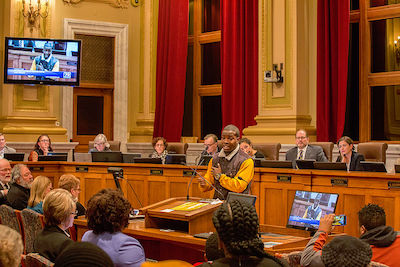
Fast, affordable Internet access for all.

We have already seen Virginia and Missouri take up legislation to preempt local control and deter municipal networks. Although bearing innocuous names such as the “Virginia Broadband Deployment Act,” these bills stifle competition instead of empowering communities.
Local governments, however, have often stepped forward to champion municipal networks and push back against state preemption bills. We’ve collected several over the years. Let these excerpts of resolutions from years past inspire you throughout the rest of 2017:
2011 - Chapel Hill, North Carolina: “WHEREAS, historically it was government that funded much of the current corporate telecommunications infrastructure in the United States and government paid for and developed the Internet on which these providers depend for their profit…” (Read more here.)
2013 - Alpharetta, Georgia: “WHEREAS, House Bill 282 would tie the hands of municipal officials in their efforts to build digital networks they need to attract economic development and create a high quality of life for their citizens...” (Read more here.)
2014 - The Louisiana Municipal Association: “WHEREAS, local governments, being closest to the people are the most accountable level of government and will be held responsible for any decisions they make...” (Read more here.)
Many other cities have also passed resolutions opposing state legislation and encouraging local control, including:

Municipalities are increasingly realizing they need to take steps to ensure fast, affordable, reliable Internet access for local citizens. Some are doing the work themselves with publicly owned projects while others seek public-private partnerships. In order to capitalize on collaboration, a group of city leaders are now forming Next Century Cities.
On October 20, 2014, they will webcast the official launch from Santa Monica at 9:30 a.m. - 1 p.m. PT / 12:30 p.m. - 4 p.m. ET. From the announcement:
We're proud to announce the official launch of Next Century Cities. Next Century Cities is a new, city-to-city collaboration that supports community leaders across the country as they seek to ensure that all have access to fast, affordable, and reliable Internet. Founding Partners represent dozens of cities from across the United States.
On October 20, we will be officially launching at Cross Campus in Santa Monica, CA. Our event will bring together mayors from communities across the country, as well as successful technologists who have helped to implement and run some of the nation's most impressive broadband networks. We're proud to host mayors and leaders from across the country for a series of thought-provoking discussions about how high-quality broadband Internet has begun to empower American communities.
Featured speakers will include
As part of the event, Susan Crawford will moderate a panel discussion with Mayors and city leaders from a variety of communities.
The event will also include a panel discussion moderated by Christopher Mitchell with information and innovation leaders from the cities of Santa Monica, Boston, Kansas City, Portland, Raleigh, and Lafayette.
 "We had to choose an area that could offer a low cost of doing business, while delivering an infrastructure better than that of other states and countries," wrote Mr. Kalinoski, a three-time, award nominee for his special effects contributions to Black Swan and LOST, the Final Season.
"We had to choose an area that could offer a low cost of doing business, while delivering an infrastructure better than that of other states and countries," wrote Mr. Kalinoski, a three-time, award nominee for his special effects contributions to Black Swan and LOST, the Final Season.